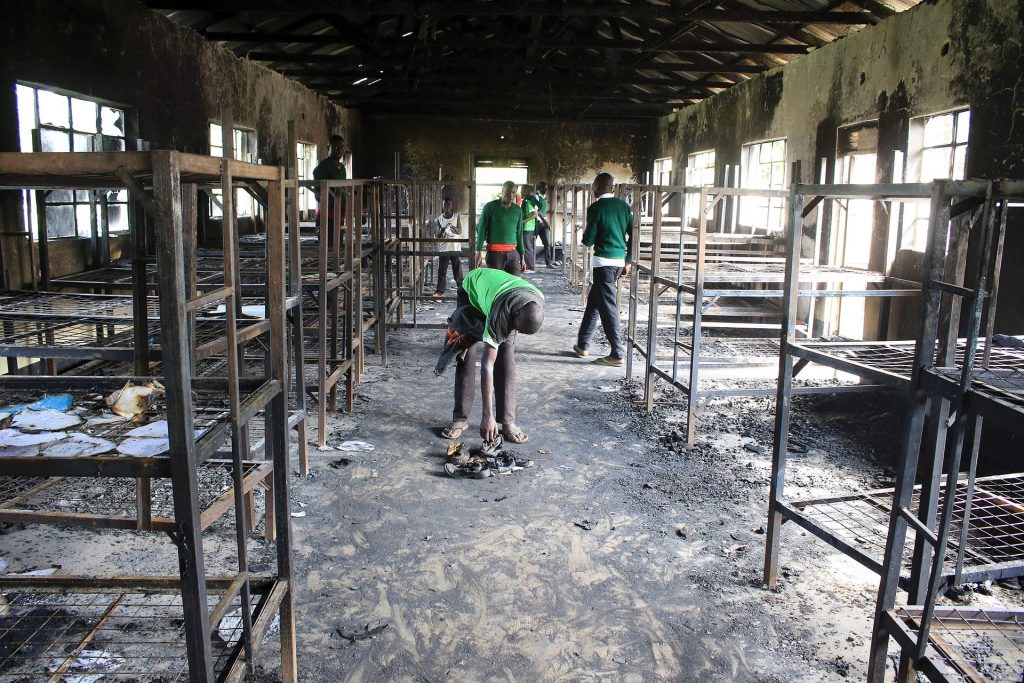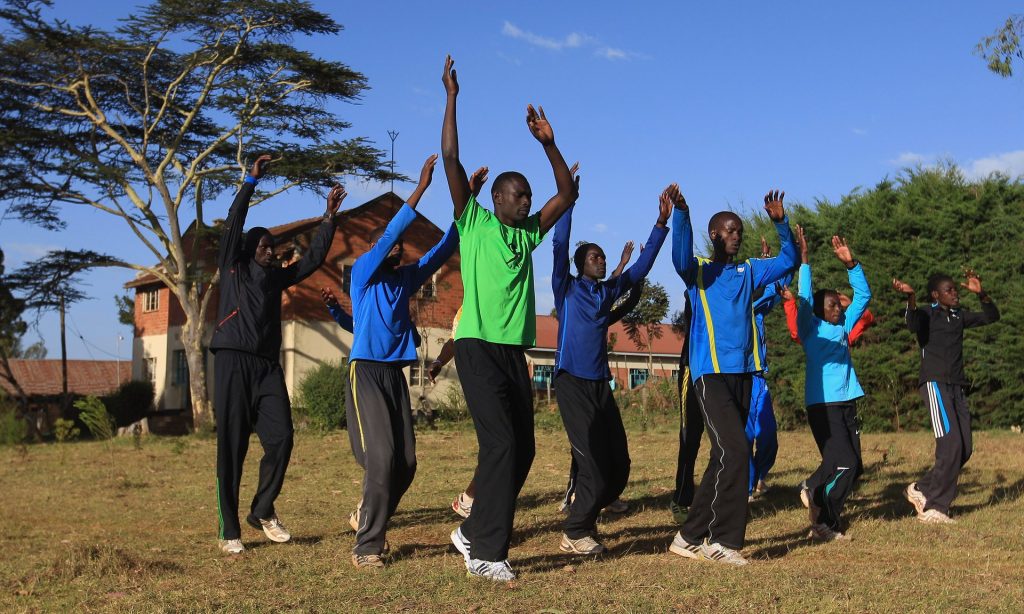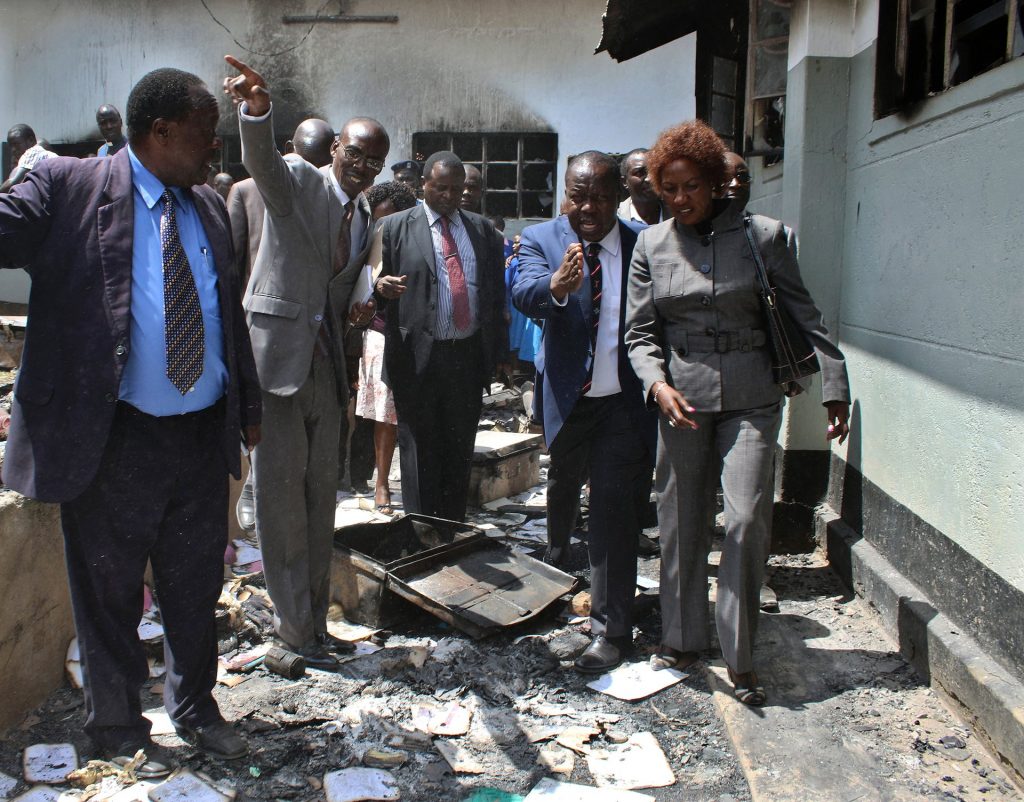
Photograph: AFP/Getty Images
Set in the picturesque rolling hills of the Kerio Valley, St Patrick’s Iten is one of Kenya’s best known schools, as noted for the academic pedigree of its students as for its production line of elite athletes.
Its alumni include David Rudisha, the double Olympic 800-metre champion, Wilson Kipketer, a three-time world champion over the same distance, and Peter Rono, 1500m gold medallist at the 1988 Olympics.
On 26 July, however, St Patrick’s Iten was in the news for the wrong reasons. Students set one of the dormitories on fire, the latest of roughly 120 such acts of arson by pupils at Kenyan schools since June. There is widespread bafflement at why students are engaging in this bizarre form of protest, but theories abound.
The new education minister, Fred Matiangi, a combative figure who has already introduced many reforms, has accused cartels unhappy at efforts to thwart systematic exam cheating, which has blighted past national examinations, of inciting students.
Commentators have suggested everything from political sabotage and copycat action by students to boredom, protest at authoritarian school leadership, and the bad example set by politicians in one of Africa’s more raucous democracies.
Johnston Kavuludi, a former provincial director of education who is now chairman of the national police service commission, believes the crisis has complex roots that require an equally sophisticated policy response.
“Society has changed,” says Kavuludi. “This is a very different generation from those we had in the past. The ICT revolution means that these are children, who have access to a broad array of information and social media, feel much more empowered than in the past. But the school system has not changed and remains very much a place where there is a top-down approach to management.”
Kavuludi says Kenya needs to engage in root and branch reform of the education system to make it more democratic, and to open more avenues for engagement with students. He says Kenya’s evolution into a more open society should be reflected in the school system, and has called for teachers to be trained in psychology to help them engage more robustly with students, instilling in them a sense of ownership of their schools.

Photograph: Michael Steele/Getty Images
The author and journalist Charles Onyango-Obbo, writing in Kenya’s biggest newspaper, the Daily Nation, suggested that the fact students were only burning dormitories could be a sign of their frustration with an incredibly structured and regimented system that affords them too little autonomy. “Students get up too early when they still want to sleep, and are kept away studying late or doing other things when they would want to go in and sleep,” wrote Onyango-Obbo.
Kavuludi takes that analysis further, arguing that while living conditions in most Kenyan homes have improved over time, those in schools – which have experienced record rates of enrolment since the introduction of free primary education and partially free high school education in 2003 – have arguably got worse. He says crowded dormitories are evidence that schools need to be made more accommodating spaces for students.
The Guardian was barred from visiting a number of schools in Nairobi where dormitories have been torched. However, students who spoke to the Sunday Nation on condition of anonymity cited a laundry list of complaints as the source of their frustrations. Most blamed high-handed administrators, while some pointed to poor conditions in their schools including inadequate food rations.
“How can a big school like Njonjo girls high school give one loaf of bread to six girls to share for breakfast, while in most other schools the minimum quantity of bread is a quarter loaf per student?” asked one pupil from a school in the central Kenya highlands.
It is hard to emphasise how seriously parents take education in Kenya. In a country with few mineral resources, education is widely seen as the main passport to a better life. Parents sell cows and take loans – using title deeds on their land as security – to get their children into the best schools. They are conscious that good grades lead to coveted degree courses that can win jobs in Kenya’s service-driven economy.
In the 2016-17 budget, the education ministry again drew the biggest allocation, taking 399bn Kenyan shillings (£3.02bn), about 18% of government spending. Yet there have been reports of widespread corruption in the use of these funds and the UK’s Department for International Development withdrew backing for the sector in 2009.
Some teachers have been accused of inflating the number of students in their schools to receive more funding. Matiangi told parliament that the reforms he has initiated, which includie tightening rules to make it harder to cheat in national exams, had triggered blowback from head teachers.

Photograph: AFP/Getty Images
Wilson Sossion, secretary general of the powerful Kenya National Union of Teachers, disputes that analysis. “Teachers work very hard to put the infrastructure in schools in place,” he says. “Nothing disturbs teachers more than hearing that school structures have been burned down. I wouldn’t even bear to visit a school where dormitories have been gutted by fire. Why would anyone then imagine teachers can be involved in this?”
Sossion says the school system must be reformed to minimise conflict between school administrations and the student body. He also wants the education ministry to take a more consultative approach, saying that students may be reacting to “abrupt changes in the school calendar”, such as the recent decision to shorten the August school holiday.
“We need to create schools that are fit for the 21st century. In Kenya, the [2010] constitution has granted people a lot of rights. The school environment should be no different. We need to rethink everything. For example, why are phones still banned in schools yet, when the students go home, they have access to them constantly?”
The August school holidays have brought some respite. However, on 18 August, final year students at Butula high school in Busia torched a dormitory in a late-night attack after being asked to stay behind to prepare for the national exams.
As schools reopen this week for the third term, when those exams will be sat, all eyes will be on the authorities to see how they contain the strange and perplexing wave of school fires.

